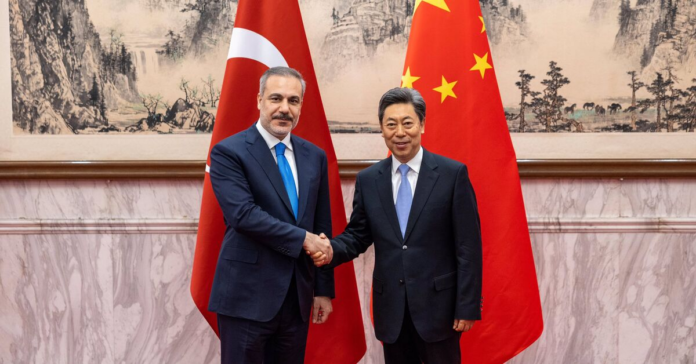June 3, 2024
ANKARA — Turkish Foreign Minister Hakan Fidan arrived on Monday to China in the first such trip for Turkey’s top diplomat, which will also include travel to the Xinjiang Uyghur Autonomous Region.
Fidan held his first meeting with Chen Wenqing, senior official of the Communist Party of China who oversees intelligence and police, as part of his three-day visit to the country. He then met with the Turkish business community in China, the Turkish Foreign Ministry said.
In addition to his Chinese counterpart, Wang Yi, Fidan is also set to meet with Vice President Han Zheng during the visit, Turkey’s state broadcaster TRT reported, citing Turkish diplomatic sources.
First high-level visit to Uyghur region since 2012
Following his meetings in Beijing, Fidan is also slated to travel to Urumqi and Kashgar in the Xinjiang Uyghur Autonomous Region in northwest China, marking the first high-level Turkish visit to the region since Prime Minister Recep Tayyip Erdogan’s visit in 2012.
Sibel Karabel, the head of the Southeast Asian Countries Strategic Studies and Research Center at Istanbul’s Gedik University, believes the Xinjiang leg of the visit was “one of the most important keys” of Fidan’s trip.
Beijing granting permission for the visit to Xinjiang can be seen as a message not just for Turkey but also Western capitals that have been scrutinizing China’s treatment of Uyghurs, Karabel said.
“The message from the Chinese perspective is, in a way, that Xinjiang is open to foreign visits,” Karabel told Al-Monitor.
“For Turkey, in turn, the visit bears importance in terms of stressing Turkey’s continuing support for Uyghurs’ right to have equal citizenship while respecting China’s sovereignty and territorial integrity,” she added.
Once an outspoken critic of Beijing over its treatment of its Muslim minority, Erdogan had accused China of committing “genocide” against the Uyghurs in 2009. He later toned down his criticism over the past years, eyeing to deepen trade ties with the global power.
Much of the international community, including the United States and the European Union, accuses China of oppressing the Uyghurs, incarcerating tens of thousands of its largest Muslim minority in internment camps in an effort to strip them of their Muslim identity. Beijing, in turn, denies the accusations, claiming that the camps are designed to combat separatism and provide “training” to de-radicalize Islamist extremists.
Turkey is home to one of the world’s largest Uyghur diasporas. Turkish authorities in February arrested six people suspected of spying on behalf of Chinese intelligence, marking a rare public showdown against the Asian powerhouse.
The trade imbalance
In Beijing, Fidan and Chinese officials will discuss bilateral cooperation between the two countries, as well as regional and global issues during the visit, the Turkish Foreign Ministry said on Saturday.
China remains Turkey’s largest trade partner in Asia and its third-largest trade partner in the world, with the trade volume between the two countries standing at more than $47 billion last year. Ankara is seeking to increase its exports to China, as the balance of trade between the two countries is staggeringly in China’s favor, with Turkey’s imports from China exceeding $44 billion last year.
The imbalance “is one of the major structural problems in the bilateral ties and this problem can be eased through direct investments and mutual projects, involving China’s Belt and Road Initiative,” Karabel said, in reference to a gigantic transit corridor aiming to connect China to Europe and Africa via more than 60 countries.
“I think this problem and initiatives aimed at reducing the foreign trade deficit will be among the top issues to be discussed in Fidan’s meetings with both his counterpart and other Chinese representatives,” she added.
Fidan’s visit comes only a week after Turkish Energy Minister Alparslan Bayraktar ‘s visit to China for talks involving a third nuclear power plant that Turkey has been planning to build in the country’s northwest region. Bayraktar said the two countries were close to a deal on the plant, speaking after the visit.
China’s Foreign Minister Wang Yi traveled to Turkey in July in one of his first visits abroad after his appointment to his post the same month.
This is a developing story and will be updated.




